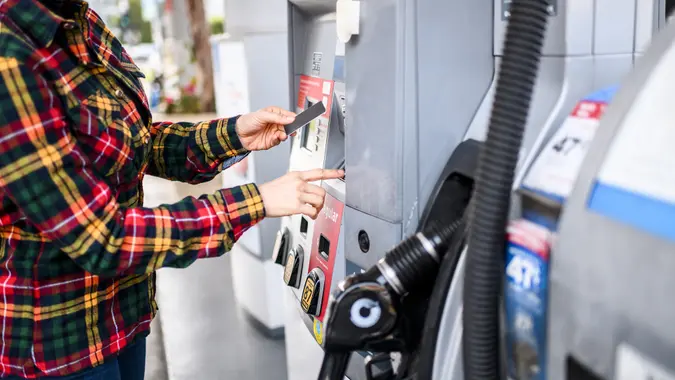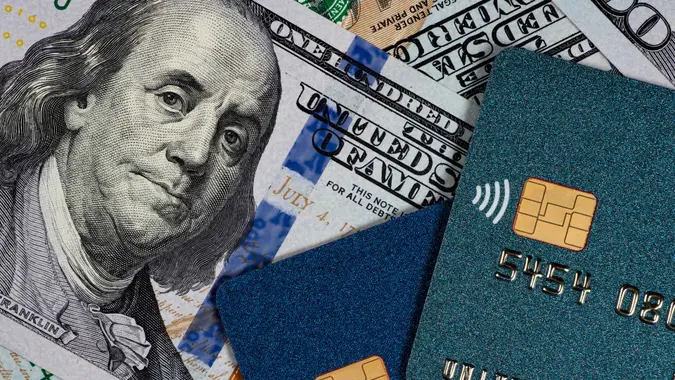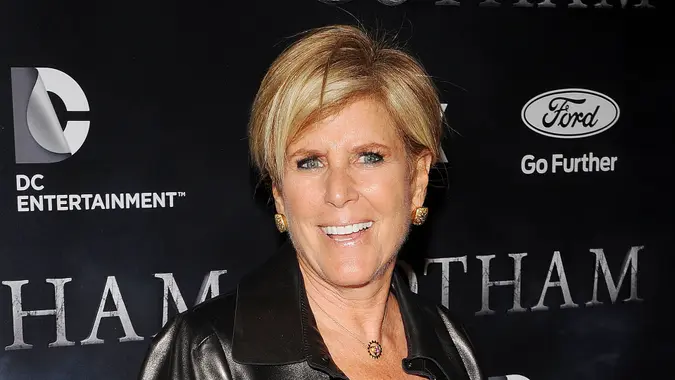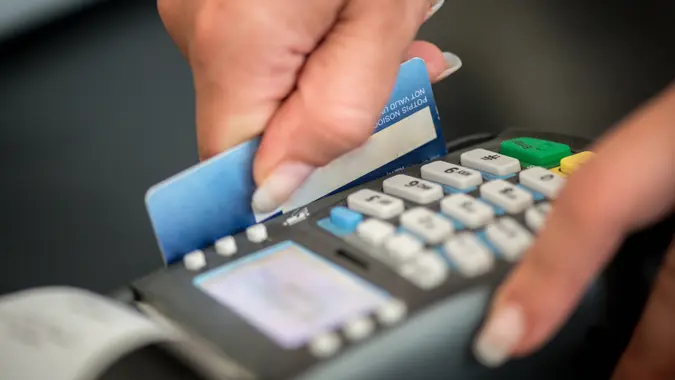How Many Credit Cards Should You Have? Experts Weigh In

Commitment to Our Readers
GOBankingRates' editorial team is committed to bringing you unbiased reviews and information. We use data-driven methodologies to evaluate financial products and services - our reviews and ratings are not influenced by advertisers. You can read more about our editorial guidelines and our products and services review methodology.

20 Years
Helping You Live Richer

Reviewed
by Experts

Trusted by
Millions of Readers
The majority of Americans own either one (28%) or two credit card(s) (25%), a recent GOBankingRates survey found — but how many credit cards is the ideal number?
According to experts, there is no one-size-fits-all answer, but there are some general rules of thumb.
If You Are Building Your Credit Back Up, Stick To One
Lyle David Solomon, principal attorney at Oak View Law Group, recommends that his clients cut back on their credit card use when they are recovering from a major blow to their credit score, such as a bankruptcy filing.
“Generally, when people are just getting out of bankruptcy, I recommend that people only have one card and use it sparingly,” he said. “Make small purchases here and there, under $100, and pay it off in full right away to build up a credit history.”
However, if the reason you had to file bankruptcy was due to credit card debt and you do not trust yourself to spend responsibly, it could be best to forgo having a credit card altogether.
“Some people can’t even have one and need to stick with a debit card,” Solomon said.
Generally, Three to Four Cards Is a Good Number
“For most people, I feel three to four [credit cards] is appropriate,” Solomon said. “It is good to have a daily use card with a good rewards program. If you travel frequently, an airline miles card or hotel rewards card is also beneficial. Also, there are still some places that only take one type of card. It is good to have a mix of Visa, Mastercard and American Express for different situations. When making a large purchase of electronics, it is nice to have the AMEX guarantees, as well as other benefits.”
Plus, different rewards cards have different benefits, so it’s best to have a mix for different types of purchases.
“Having multiple cards in your wallet and using those cards on the types of purchases that earn you the most rewards can be a great way to maximize the value you get from your credit cards,” said Justin Zeidman, assistant vice president of open banking at Navy Federal Credit Union. “Responsible credit usage is paramount, but if you are in a financial place where you can manage more than one card, it can be very beneficial to have multiple cards in your wallet.”
You Can Have More Than Four If You’re a Credit Card Pro
If you’re in good financial standing and want to reap the most credit card rewards possible, you may want to have even more than four cards.
“The ideal number of cards is unique to the individual,” Solomon said. “I know one person with 27 credit cards, but she also has an 800-plus credit score, has a seven-figure income and travels constantly. She uses her cards to save herself well over $10,000 per year.”
Credit expert John Ulzheimer agrees that there is no maximum number of credit cards for a person with good spending habits.
“For someone who is responsible about using their cards and never carries a balance, there is no number of cards that’s too many,” he told CNBC Select.
More From GOBankingRates
- 6 Expensive Costco Items That Are Definitely Worth the Cost
- 5 Unnecessary Bills You Should Stop Paying in 2024
- 5 Reasons You Should Consider an Annuity For Your Retirement Savings
- 10 New Cars to Avoid Buying in 2024
Methodology: GOBankingRates surveyed 1,003 Americans ages 18 and older from across the country between Sept.19 and Sept. 20, 2022, asking 12 questions: (1) Which of the following is the most important to you when it comes to picking a new credit card?; (2) How do you handle your credit card bill each month?; (3) Do you know your credit score?; (4) At what age did you get your first credit card?; (5) What is your primary purpose for using your credit card(s)?; (6) Do any of the following statements apply to you? (Select all that apply); (7) Which credit card fees do/would you hate the most?; (8) How many credit cards do you own?; (9) What is your total current credit card debt?; (10) How long do you think it will take you to pay off your credit card debt?; (11) Have you ever hit the credit limit on your credit card?; and (12) Have you ever charged any of the following to your credit card? Select all that apply. GOBankingRates used PureSpectrum’s survey platform to conduct the poll.
 Written by
Written by  Edited by
Edited by 
























